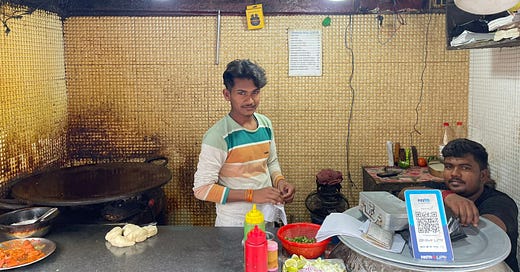Two Paths, One Stall: Mantu and Pankaj's Journey
Tracking Indian Youth Workers: Mantu Kumar & Pankaj
The Tracking Indian Youth Workers Media Fellowship presents the next in a series of stories capturing the lives of young workers across India.
Mantu Kumar, 24 years old, comes from Jharkhand, and Pankaj, 20 years old comes from Bihar. While they come from different backgrounds, carry contrasting responsibilities, and were driven to Kolkata by entirely different circumstances, together they run a bustling street-side food stall. Mantu, the eldest son in his family, carries the weight of supporting his parents and saving money for his sister’s dowries. Pankaj dreams of a more carefree future—one where he might dance his way to fame.
“After the lockdown, our financial situation worsened. My father was getting older, and we had to think about my sisters’ dowries. So I came here to support my family.”- Mantu
“I ran away from home. I was just tired of that life. When you live in a village, you think the city is a dreamland where all your wishes come true. Of course, that’s not true—but I didn’t know that at 19.”- Pankaj
Read their full story below. Profile by Roshni Veronika Mallick.
Roshni: Thanks for making the time! Could you tell me a little bit about yourselves?
Mantu: My name is Mantu Kumar, and I’m 24 years old. This is Pankaj—he’s 20. I’ve been running this food stall together for the past three years. I’m from Jharkhand and the eldest son in my family. I have two sisters, one of whom is about to get married. My father is a farmer.
Pankaj: I’m Pankaj, 20 years old, from Bihar. I’m an only child, and both my parents are farmers.
Roshni: What was your childhood like?
Mantu: It was a typical village childhood. We played gilli-danda as kids, and once I was old enough, I started helping my father on the farm. I didn’t go to school because there wasn’t one in our village. Even the market was miles away.
Pankaj: Mine was similar, but I did go to school until around Class 4—I don’t really remember why I stopped. I guess my parents got tired of my tantrums about not wanting to go. Since I was an only child, they would get mad at me, but they couldn’t exactly throw me out—so I just lazed around at home most of the time.
Roshni: What brought you to Kolkata?
Mantu: I came in 2022. After the lockdown, our financial situation worsened. My father was getting older, and we had to think about my sisters’ dowries. So I came here to support my family. A friend from my village had already moved, and he helped me find this job.
Pankaj: I ran away from home. I was just tired of that life. When you live in a village, you think the city is a dreamland where all your wishes come true. Of course, that’s not true—but I didn’t know that at 19. I worked odd jobs—changing tires, working in a small restaurant in Gariahat, even selling snacks during Durga Puja. I joined Mantu bhai at this stall early last year.
Roshni: What is the bond between you two like?
Pankaj: Mantu bhai is like my elder brother. He’s more serious, more responsible—I guess that’s because he has a family depending on him. I, on the other hand, can be careless sometimes, and he scolds me for it. But he also takes care of me, and gives me advice when I feel lost. We’ve built a life here together, and even though we come from different places and have different dreams, we’re in this together.
Pankaj (20) on the left and Mantu (24) on the right.
Roshni: Where do you live? Are the conditions good?
Mantu: The man who owns this stall—our boss—helped us find a one-room dormitory near Jadavpur Police Station. The rent is ₹2,000 per month, and we split it. It’s okay—there are other workers like us, and we share a common bathroom.
Pankaj: Since our stall runs from 12 PM to 10 PM, we usually eat lunch and dinner here—sometimes leftover chow mein or momo. And once in a while, we sneak in a chicken roll for ourselves. Our boss doesn’t know.
Roshni: What challenges do you face?
Mantu: The extreme heat in summer and the risk of dengue during the monsoon make working conditions tough. Some customers can be rude, and there are times when people place orders but never show up, or they eat and refuse to pay. The work itself can feel monotonous—cooking the same dishes every day. Restocking ingredients is another challenge since we have to wake up early to buy from wholesale markets to get better prices. On top of that, competition is fierce—just look around, there are more than ten food stalls in this lane alone.
Roshni: If you could choose a different career, what would it be?
Mantu: I’m not really sure. I’ve been doing this for a while, and I’ve never thought about anything else. This is my life, it’s always been this way. I don't really know any other way of living. My priority is earning enough to support my family.
Pankaj: Maybe a dancer! I love dancing. I used to watch dance videos on YouTube when I worked at the restaurant, and I even tried learning a few steps. If I had the time and money, I’d love to train properly. Who knows? Maybe one day I’ll be on TV!
Roshni: All the best to both of you! Thank you so much for sharing your stories with me. And Pankaj, I hope to see you on TV one day—but for now, rest assured, you’ll soon be making your debut on our website!
This is an ongoing series of profiles documenting the experiences of young people across India. Stay tuned for more stories from young workers across India. Follow us on social media for more updates.




